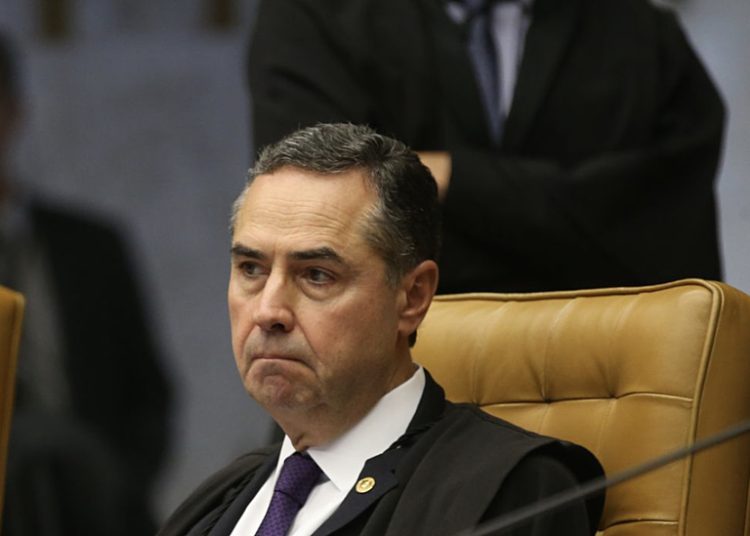This Thursday (31), Supreme Court Justice Luíz Roberto Barroso voted against the so-called “timeframe thesis” on Indigenous lands. With his vote, the score is 4-2 against the legal thesis created by big landowners, which prohibits Indigenous peoples from claiming lands they did not occupy on the date of promulgation of Brazil’s 1988 Constitution.
Justices Cristiano Zanin, Edson Facchin and Alexandre de Moraes also voted against the thesis, while André Mendonça and Nunes Marques – both appointed by Bolsonaro to the Supreme Court – support the thesis. There are still five justices to vote. If six justices reject the timeframe thesis, the Supreme Court will form a majority against it, therefore setting the victory of Indigenous peoples in Brazil.
In his speech, Barroso said the Constitution does not contemplate the timeframe criterion to demarcate Indigenous lands. According to the justice, the document “guarantees to Indigenous peoples the right to land in the light of their culture, not based on the habits of the dominant society”.
Barroso also said that some criteria should be adopted to prove the connection an Indigenous people has with a territory, such as the permanence of these populations as rural workers, the use of the area for religious rituals and their resistance against invaders.
Zanin voted against the timeframe thesis
Justice Cristiano Zanin, recently appointed to the Supreme Court by President Luiz Inácio Lula da Silva, said that Brazil’s Constitution acknowledges that the rights of Indigenous peoples to land are “older” than “any other”. “Thus, the timeframe thesis cannot be validated for it would ignore Indigenous populations”, he stated.
As Indigenous leaders point out, Zanin recognized that Indigenous peoples were forced into “involuntary displacements and were the target of conflicts and threats”, which would create an unfair situation if the timeframe thesis was applied.
“Therefore, it cannot be imposed any kind of timeframe thesis to the detriment of Indigenous peoples, who have the protection of exclusive possession since the empire in a constitutional series”.
Understand the case
The so-called “timeframe thesis” consists of a legal proposition establishing that Indigenous peoples have the right to demand only those lands they already occupied or were disputing until October 5, 1988, when Brazil’s Constitution was promulgated.
The origin of this thesis goes back to 2009 when the Office of the Attorney General’s opinion was applied to the demarcation of Raposa-Serra do Sol Indigenous land in Roraima state, adopting this specific criterion.
In 2003, the Ibirama-Laklãnõ Indigenous land was created. However, a portion of it occupied by the Xokleng Indigenous people and disputed by agribusinessmen became the center of a case at the Supreme Court started by the government of Santa Catarina state. The core issue was whether the area, approximately 80,000 m², was occupied on October 5, 1988.
The Xokleng people argued they were not occupying the land at the time due to expulsions. The decision on the case in Santa Catarina will have broader implications for it will establish the Supreme Court’s understanding about the validity of the timeframe thesis on a national level. It will affect over 80 similar cases and more than 300 legal cases related to the demarcation of Indigenous lands that are waiting for the Court’s resolution.
In 2021, Brazil’s Supreme Court Justice Marques Nunes advocated for the timeframe thesis by arguing that its rejection could lead to an “unlimited expansion” of areas that are already part of the country’s real estate market. He also stated that, without the thesis, national sovereignty and independence would be at risk. According to Marques, the approval of the timeframe thesis is crucial to prevent conflicts and guarantee legal certainty.
Justice Edson Facchin, the rapporteur on the case, disagrees. He argues that Indigenous peoples' right to land and precedes the very formation of the state. Facchin highlights that the constitutional protection of these rights did not depend on a specific timeframe limitation and that land demarcation is a declaratory act, not an inventive one.
The divergent views on the timeframe thesis have significant consequences not only for the Santa Catarina case but for the general approach to be adopted about the territorial rights of Indigenous peoples in Brazil.
Trial
The timeframe trial has sparked intense discussion, resulting in experts debating its possible implications if it is validated. Debates highlight the complexity the demarcation of new Indigenous lands will face with the adoption of the thesis since it omits all the historical violence and marginalization Indigenous peoples have endured throughout Brazilian history.
It relates to the fact that, historically, the Indigenous communities in Brazil were targeted by many kinds of violence and were gradually deprived of their lands, quite frequently without any protection or effective defense. Therefore, adopting such a thesis to determine the validity of territorial demands does not take into consideration injustices and past oppressions.
Furthermore, there are arguments about how the timeframe thesis will boost new conflicts, including in areas previously pacified. From this point of view, Indigenous lands could possibly be invaded, and legal actions taken to expel Indigenous peoples from their ancestral lands.
Another relevant aspect is the consequences of the demarcation of Indigenous lands to environmental preservation since the uncontrolled expansion of agribusiness has been decisive to deforestation, changes in rainfall patterns, rise in temperatures and other environmental problems. It is important to mention that many consider the timeframe thesis incompatible with the Federal Constitution since the document guarantees the right of Indigenous peoples to their lands.
Agribusiness entrepreneurs and their supporters argue that the timeframe thesis is essential to provide more legal clarity to territorial demarcations and, mainly, to prevent agribusinessmen from losing properties.




